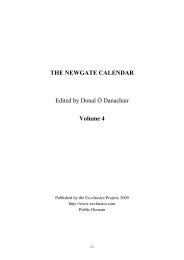PDF format (1.55 Mb) - The Ex-Classics Web Site
PDF format (1.55 Mb) - The Ex-Classics Web Site
PDF format (1.55 Mb) - The Ex-Classics Web Site
Create successful ePaper yourself
Turn your PDF publications into a flip-book with our unique Google optimized e-Paper software.
THE ANATOMY OF MELANCHOLY<br />
earth (for, say they, if a man's eye were in the firmament, he should not at all discern that great<br />
annual motion of the earth, but it would still appear punctum indivisibile and seem to be fixed in<br />
one place, of the same bigness) that it is quite opposite to reason, to natural philosophy, and all<br />
out as absurd as disproportional (so some will) as prodigious, as that of the sun's swift motion of<br />
heavens. But hoc posito, to grant this their tenet of the earth's motion: if the earth move, it is a<br />
planet, and shines to them in the moon, and to the other planetary inhabitants, as the moon and<br />
they do to us upon the earth: but shine she doth, as Galileo, Kepler, and others prove, and then<br />
per consequens, the rest of the planets are inhabited, as well as the moon, which he grants in his<br />
dissertation with Galileo's Nuncius Sidereus, "that there be Jovial and Saturn inhabitants," &c.,<br />
and those several planets have their several moons about them, as the earth hath hers, as Galileo<br />
hath already evinced by his glasses: four about Jupiter, two about Saturn (though Sitius the<br />
Florentine, Fortunius Licetus, and Jul. Caesar le Galla cavil at it) yet Kepler, the emperor's<br />
mathematician, confirms out of his experience, that he saw as much by the same help, and more<br />
about Mars, Venus, and the rest they hope to find out, peradventure even amongst the fixed stars,<br />
which Brunus and Brutius have already averred. <strong>The</strong>n (I say) the earth and they be planets alike,<br />
moved about the sun, the common centre of the world alike, and it may be those two green<br />
children which Nubrigensis speaks of in his time, that fell from heaven, came from thence; and<br />
that famous stone that fell from heaven in Aristotle's time, olymp. 84, anno tertio, ad Capuas<br />
Fluenta, recorded by Laertius and others, or Ancile or buckler in Numa's time, recorded by<br />
Festus. We may likewise insert with Campanella and Brunus, that which Pythagoras,<br />
Aristarchus, Samius, Heraclitus, Epicurus, Melissus, Democritus, Leucippus maintained in their<br />
ages, there be infinite worlds, and infinite earths or systems, in infinito æthere, which Eusebius<br />
collects out of their tenets, because infinite stars and planets like unto this of ours, which some<br />
stick not still to maintain and publicly defend, sperabundus expecto innumerabilium mundorum<br />
in æternitate per ambulationem, &c. (Nic. Hill. Londinensis philos. Epicur.) For if the firmament<br />
be of such an incomparable bigness, as these Copernical giants will have it, infinitum, aut infinito<br />
proximum, so vast and full of innumerable stars, as being infinite in extent, one above another,<br />
some higher, some lower, some nearer, some farther off, and so far asunder, and those so huge<br />
and great, insomuch that if the whole sphere of Saturn, and all that is included in it, totum<br />
aggregatum (as Fromundus of Louvain in his tract, de immobilitate terræ argues) evehatur inter<br />
stellas, videri a nobis non poterat, tam immanis est distantia inter tellurem et fixas, sed instar<br />
puncti, &c. If our world be small in respect, why may we not suppose a plurality of worlds, those<br />
infinite stars visible in the firmament to be so many suns, with particular fixed centres; to have<br />
likewise their subordinate planets, as the sun hath his dancing still round him? which Cardinal<br />
Cusanus, Walkarinus, Brunus, and some others have held, and some still maintain, Animæ,<br />
Aristotelismo innutritæ, et minutis speculationibus assuetæ, secus forsan, &c. Though they seem<br />
close to us, they are infinitely distant, and so per consequens, there are infinite habitable worlds:<br />
what hinders? Why should not an infinite cause (as God is) produce infinite effects? as Nic. Hill.<br />
Democrit. philos. disputes: Kepler (I confess) will by no means admit of Brunus's infinite<br />
worlds, or that the fixed stars should be so many suns, with their compassing planets, yet the said<br />
Kepler between jest and earnest in his perspectives, lunar geography, & somnio suo, dissertat.<br />
cum nunc. sider. seems in part to agree with this, and partly to contradict; for the planets, he<br />
yields them to be inhabited, he doubts of the stars; and so doth Tycho in his astronomical<br />
-50
















